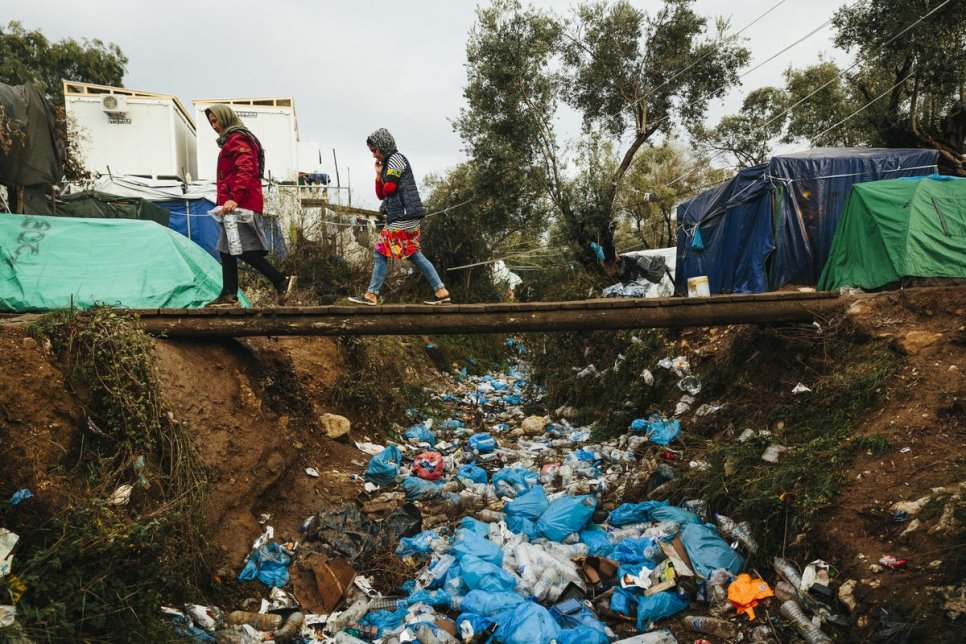This is a summary of what was said by UNHCR spokesperson Andrej Mahecic – to whom quoted text may be attributed – at today’s press briefing at the Palais des Nations in Geneva.

An Afghan asylum seeker and her daughter cross a trash-filled gully at an improvised camp on the Greek island of Lesvos, November 2019.
UNHCR, the UN Refugee Agency, is urging Greece to intensify efforts to address alarming overcrowding and precarious conditions for asylum seekers and migrants staying on the five Greek Aegean islands of Lesvos, Chios, Samos, Kos, and Leros.
UNHCR has been appealing to the Greek government to use emergency measures to expedite its plans to transfer a greater number of asylum-seekers to appropriate accommodation on the mainland. More than 36,000 asylum seekers are now staying in reception centres across five islands which were originally designed for 5,400 people.
Greece has been generous and compassionate towards refugees, despite a very complex and difficult situation, and the East Aegean islands have taken on a vastly disproportionate burden and responsibility. It is critical that other regions in Greece step up their solidarity to help alleviate pressures by receiving transferred asylum seekers and opening up reception places. Continued European resources, capacity and solidarity are also needed to boost Greece’s response.
On Samos 6,782 people are staying in a centre designed for 660 while others are in makeshift shelters pitched on surrounding fields on a steep slope. Moria on Lesvos is hosting 18,342 inside a facility for 2,200 and others are staying in adjacent olive groves.
Reception centres on Chios, Kos, and Leros are also overcrowded. The majority of asylum-seekers and migrants are families. A third of the population are children, most below the age of twelve.
Thousands of women, men, and children who currently live in small tents are exposed to cold and rain with little or no access to heating, electricity or hot water. Hygiene and sanitation conditions are unsafe. Health problems are on the rise. Despite the dedication of medical professionals and volunteers, many cannot see a doctor as there are simply too few medical staff at the reception centres and local hospitals.
Tensions were high on Lesvos earlier this week, where police faced off with asylum-seekers during their recent protest. Dire conditions and the long wait to complete asylum procedures have made asylum seekers afraid and anxious. In recent weeks local communities have also protested and demanded urgent action to alleviate the pressure of the islands.
The trust of local communities must be regained through decisive and coordinated government action strongly supported by the European Union.
Longer-term solutions and improvement of conditions on the islands are necessary but will only be possible once the overcrowded centres are decongested. UNHCR remains ready to assist with transfers and in finding quick ways to increase reception capacity. UNHCR is appealing to European States to open relocation places for unaccompanied children and other vulnerable people and to accelerate transfers for children eligible to join family members.
Nearly 2,000 children without parents or relatives in Greece are at risk at island reception centres. Over 5,300 unaccompanied children are now in Greece and only less than a quarter are in shelters adequate for their age.
Greece’s asylum system is overloaded with a backlog of nearly 90,000 cases. Government efforts to overhaul and speed up asylum procedures must maintain standards and safeguards. The majority of asylum seekers in Greece have refugee profiles and are likely to be in need of international protection.
UNHCR welcomes the creation of a dedicated ministry, the Ministry of Migration and Asylum, to strengthen the government’s capacity. The announced boost to the capacity of the Greek Asylum Service and the doubling of European Asylum Support Office staff should help address the substantial backlog of asylum cases. It is imperative for all government institutions to act now in coordination to resolve these issues. Non-governmental organizations which continue to play a vital role in Greece should be included in the response.
Arrivals to Greece are just a fraction of 2015 and 2016 number when a million people reached its shores. But with some 59,000 sea arrivals in 2019, coupled with lengthy asylum procedures, this has led to a sharp deterioration in conditions. It is critical that the EU Member States demonstrate their solidarity and help to alleviate pressure by relocating asylum seekers.
UNHCR stands ready to support Greece and find solutions to address this complex situation.
For more information on this topic, please contact:
Μοιράσου το στο Facebook Μοιράσου το στο Twitter